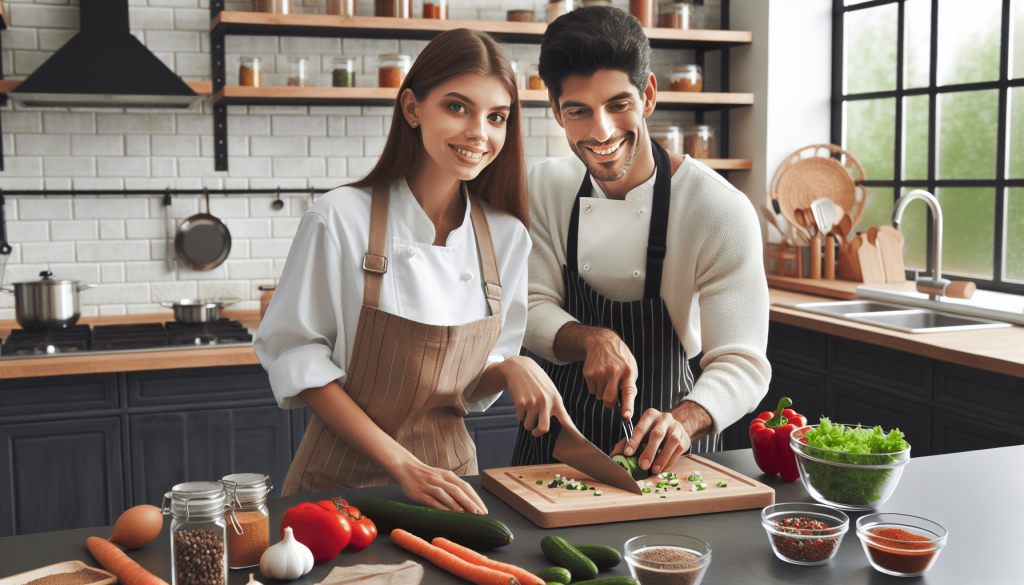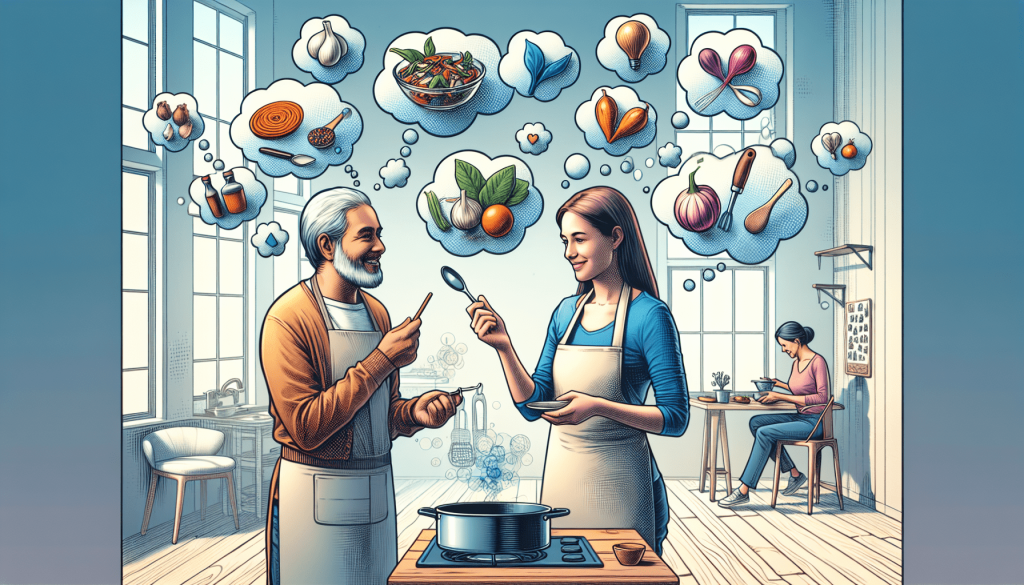Are you a beginner in the kitchen and feeling a little overwhelmed by the art of cooking? Fear not! In this article, we have compiled the top 10 cooking tips specifically tailored for beginners like you. From mastering knife skills to understanding the importance of seasoning, these tips will help you gain confidence and improve your culinary skills. So, grab your apron and get ready to embark on a delicious journey of cooking!

Choose the Right Equipment
Invest in basic kitchen utensils
Having the right tools in your kitchen is essential for successful cooking. Start by investing in basic kitchen utensils such as wooden spoons, spatulas, whisk, tongs, and a slotted spoon. These tools are versatile and will help you with various cooking tasks.
Have a variety of knives for different purposes
A knife is one of the most important tools in the kitchen. Make sure you have a variety of knives for different purposes. A chef’s knife is great for chopping, while a paring knife is suitable for smaller tasks like peeling and slicing. A serrated knife is perfect for cutting bread, and a boning knife is ideal for handling meat and poultry.
Get a good set of pots and pans
Investing in a good set of pots and pans is crucial for even cooking and heat distribution. Look for pots and pans made of high-quality materials like stainless steel or cast iron. It is also important to have a variety of sizes to accommodate different recipes and cooking techniques.
Have essential appliances like a blender and food processor
While not absolutely necessary, having essential appliances like a blender and food processor can make your cooking experience more convenient. A blender is perfect for making soups, smoothies, and sauces, while a food processor can help with tasks like chopping vegetables and kneading dough.
Read and Follow Recipes Carefully
Read the entire recipe before starting
Before you start cooking, make sure to read the entire recipe from start to finish. This will help you understand the steps and gather all the necessary ingredients and equipment beforehand. It will also give you an idea of the cooking time required, allowing you to plan your meal accordingly.
Measure ingredients accurately
Accurate measurements are crucial for successful cooking. Invest in a set of measuring cups and spoons and use them to measure your ingredients properly. Pay attention to both weight and volume measurements, as some recipes may specify one or the other.
Follow cooking instructions step by step
Following the cooking instructions step by step is essential to achieve the desired outcome. Each step is there for a reason, whether it’s to develop flavors or ensure the dish cooks evenly. Take your time and follow the instructions carefully to avoid any mishaps.
Adjust cooking time and temperature if necessary
While it’s important to follow the instructions, it’s also essential to use your judgment. If you notice that your dish is cooking faster or slower than the suggested time, adjust the cooking time and temperature accordingly. Every oven and stovetop is different, so it’s important to be flexible and make adjustments as needed.
Preparation is Key
Gather all ingredients before starting
Before you start cooking, gather all the ingredients required for the recipe. This will prevent any last-minute scrambling or interruptions during the cooking process. Having everything at hand will ensure a smooth and efficient cooking experience.
Prep ingredients before cooking
Once you have all the ingredients ready, take the time to prep them before you start cooking. Chop vegetables, measure out spices, and marinate meats if necessary. This will save you time and effort during the actual cooking process.
Mise en place: organize and arrange ingredients
“Mise en place” is a French culinary term that means “putting in place.” It refers to the practice of organizing and arranging all your prepped ingredients before you start cooking. This helps you stay organized, saves time, and ensures that you have everything ready at a glance.
Prepare the cooking space for easy access
Before you begin cooking, make sure your cooking space is clean and well-organized. Ensure that all the necessary tools and equipment are easily accessible. Having a clean and organized workspace will make your cooking experience more enjoyable and efficient.
Master Basic Knife Skills
Learn proper knife handling techniques
Proper knife handling is crucial for your safety and precision. Learn the proper grip and technique for holding a knife, keeping your fingers away from the blade and using a rocking motion for efficient chopping.
Practice different cutting methods: chopping, slicing, dicing
Different recipes require different cutting methods. Practice chopping, slicing, and dicing techniques to achieve consistent and evenly cut ingredients. This will not only enhance the presentation but also ensure even cooking.
Keep knives sharp and use the right knife for every task
Dull knives are not only frustrating to work with but also dangerous. Keep your knives sharp by regularly honing and sharpening them. Additionally, use the right knife for each task to ensure the best results.
Pay attention to safety measures
When handling knives, always prioritize safety. Keep your fingers tucked in and away from the blade, and use a cutting board to prevent accidents. Take your time and focus on the task at hand to avoid any mishaps.

Understand Cooking Terminology
Learn common cooking terms: sauté, simmer, boil, etc.
Familiarize yourself with common cooking terms to better understand recipes. Learn terms like sauté, simmer, boil, and stir-fry. Understanding these terms will help you execute recipes accurately and produce delicious dishes.
Understand culinary techniques like braising and blanching
In addition to common cooking terms, learn about culinary techniques like braising, blanching, and caramelizing. These techniques add depth of flavor and texture to your dishes, and understanding them will elevate your cooking skills.
Be familiar with technical terms used in recipes
Recipes often include technical terms that may be unfamiliar to beginners. Take the time to research and understand these terms so that you can follow the recipe accurately. Online resources, cookbooks, and cooking shows can be helpful in expanding your culinary knowledge.
Expand cooking vocabulary for better understanding
Continuously expand your cooking vocabulary to enhance your understanding of recipes and cooking techniques. Explore online resources, join cooking forums, and experiment with different recipes to familiarize yourself with a wide variety of ingredients and techniques.
Experiment with Flavors and Spices
Try different combinations of herbs and spices
Herbs and spices are an excellent way to elevate the flavors of your dishes. Experiment with different combinations to discover new and interesting flavor profiles. Start with a small amount and adjust to taste, allowing you to tailor the flavor to your preferences.
Start with small amounts and adjust to taste
When experimenting with flavors, it’s important to start with small amounts and adjust as you go. Adding too much of a particular ingredient can overpower the dish, so add a little at a time and taste as you cook. This will help you develop a sense of balance and create well-seasoned dishes.
Discover the flavors of different cuisines
One of the joys of cooking is exploring the flavors of different cuisines. Try your hand at recipes from various cultures to discover new spices, herbs, and ingredients. This will broaden your culinary horizons and make cooking a more exciting experience.
Be open to trying new ingredients and flavors
Don’t be afraid to step outside of your comfort zone and try new ingredients and flavors. Embrace the opportunity to explore different cuisines and experiment with unfamiliar ingredients. You may be pleasantly surprised by the results and discover new favorite dishes along the way.
Learn to Use Heat Correctly
Understand heat sources: stovetop, oven, grill
Different heat sources require different cooking techniques. Understand the heat sources available in your kitchen, whether it’s a stovetop, oven, or grill, and learn how to adjust the heat for each cooking method. This will ensure that your dishes are cooked properly and with the desired results.
Control heat levels: high, medium, low
Controlling the heat levels when cooking is crucial for achieving the desired outcome. Learn to adjust the heat levels between high, medium, and low to control the cooking process. This will prevent burning or undercooking your food and help you achieve the perfect textures and flavors.
Master techniques like searing, roasting, and baking
Each cooking method requires a different technique to achieve the best results. Master techniques like searing, roasting, and baking to enhance the flavors and textures of your dishes. Practice these techniques and experiment with different recipes to hone your skills.
Learn about heat transfer and distribution
Understanding heat transfer and distribution is essential for efficient and even cooking. Learn about how heat moves through different cooking surfaces and how to use it to your advantage. This knowledge will help you cook your dishes to perfection and avoid any cooking mishaps.
Taste and Season Properly
Taste food as you cook to adjust flavors
Tasting your food as you cook is a crucial step in adjusting the flavors. It allows you to make any necessary adjustments, whether it’s adding more seasoning, adjusting the sweetness, or balancing the flavors. Don’t be afraid to make changes as you go to achieve the perfect taste.
Learn to season food with salt, pepper, and other seasonings
Salt, pepper, and other seasonings are essential for enhancing the flavors of your dishes. Learn how to season food properly, using salt and pepper as a base and adding other seasonings to create depth and complexity. Experiment with different spices and herbs to find your preferred flavor profiles.
Balance flavors: sweet, salty, sour, bitter, umami
Achieving a balance of flavors is what sets a good dish apart. Pay attention to the five basic tastes – sweet, salty, sour, bitter, and umami – and learn how to balance them effectively. Aim for a harmonious blend of flavors that complement each other.
Follow recommended seasoning guidelines
Recipes often provide recommended seasoning guidelines, and it’s important to follow them for the best results. However, feel free to adjust the seasonings to suit your taste preferences. As you gain more experience, you’ll develop a better understanding of your personal seasoning preferences.
Practice Time and Task Management
Create a cooking schedule and timeline
To ensure a smooth cooking process, create a cooking schedule and timeline. This will help you stay organized and manage your time effectively. Allocate time for prep work, cooking, and plating, making sure you have enough time to complete each step without rushing.
Organize tasks to maximize efficiency
Organize your cooking tasks to maximize efficiency. Start by completing any prep work, then move on to tasks that require longer cooking time while you work on other components simultaneously. This will help you streamline your cooking process and ensure that everything comes together at the right time.
Multi-task when appropriate
When appropriate, multitask to save time and streamline the cooking process. For example, while ingredients are simmering, you can prepare a side dish or start cleaning up. Be mindful of which tasks can be done simultaneously without compromising the quality of your dishes.
Practice time management skills for smoother cooking
Time management is a valuable skill in the kitchen. Practice managing your time effectively by staying organized, working efficiently, and prioritizing tasks. As you become more proficient, you’ll find that cooking becomes smoother and more enjoyable.
Don’t Be Afraid to Make Mistakes
Embrace failures as learning opportunities
Don’t be disheartened by cooking failures. Instead, see them as learning opportunities. Embrace mistakes and use them to improve your cooking skills. Every cook, no matter how experienced, makes mistakes, so be patient with yourself and persist in your culinary journey.
Learn from mistakes and try again
When you make a mistake, take the time to understand what went wrong and learn from it. Reflect on the process and make adjustments for your next attempt. Trying again not only builds resilience but also helps you develop a deeper understanding of cooking principles.
Ask for advice and tips from experienced cooks
Don’t hesitate to seek advice and tips from experienced cooks. They have valuable knowledge and insights that can help you navigate your cooking journey. Join cooking communities, take cooking classes, or simply reach out to experienced cooks for guidance and support.
Don’t be discouraged by setbacks
Setbacks are a natural part of the learning process. Don’t let them discourage you from pursuing your passion for cooking. Instead, view setbacks as opportunities for growth and improvement. Keep practicing, experimenting, and learning, and soon you’ll find yourself creating delicious meals with confidence.
